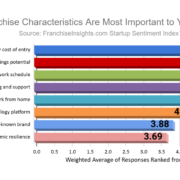The Franchise Decision Funnel: How Smart Buyers Cut Through the Noise and Make Better Decisions
Most people approach franchising backwards.
They start with brands.
Logos.
What’s trending.
What a friend mentioned at a dinner party.
It feels productive, but it’s usually not.
After working with hundreds of franchise buyers over the years, I’ve noticed that the best decisions tend to follow a very different path. I think of it as a decision funnel—a way to intentionally filter out noise so you can land on a franchise that actually fits your life, not just your imagination.
Top of the Funnel: The Noise
This is where almost everyone begins.
The noise includes:
-
Hot or trendy brands
-
Social media hype
-
Eye-catching marketing
-
“This looks exciting” instincts
-
Well-meaning opinions from friends and family
There’s nothing wrong with noticing these things. Curiosity is normal. But the problem is when buyers stop here.
The noise is loud, emotional, and exciting—but it offers very little clarity. At this stage, people often confuse interest with suitability. A franchise can look amazing and still be a terrible fit.
The role of the funnel is to move you past this stage as quickly as possible.
Second Layer: The Reality Check
This is where franchising becomes real—and where many people get uncomfortable.
The reality check forces you to look at:
-
The actual time commitment, especially early on
-
How long it takes for cash flow to stabilize
-
Staffing and management responsibilities
-
The owner’s role day-to-day (not the brochure version)
This is also where assumptions get challenged.
“ Semi-absentee ” often isn’t semi-absentee at first.
Cash flow rarely looks like projections in year one.
Systems still require leadership to work well.
Buyers who skip or rush through this stage often end up frustrated later—not because the franchise is bad, but because expectations were unrealistic.
Discomfort here is a good sign. It means you’re paying attention.
Third Layer: The Fit
Almost no one starts here.
But this is where they should.
Fit has very little to do with brand strength and everything to do with you.
This layer looks at:
-
Income needs versus patience level
-
Risk tolerance
-
Lifestyle constraints
-
How you want to spend your time—not how you think you should want to
Two people can look at the same franchise and have completely different outcomes because their definitions of success are different.
A franchise that’s perfect on paper can still be wrong if it doesn’t align with your goals, energy, or season of life.
This is also where honest conversations matter most—because clarity here narrows the field quickly and saves time.
Bottom of the Funnel: The Right Decision
The bottom of the funnel is surprisingly quiet.
The right franchise decision usually isn’t flashy.
It doesn’t impress strangers.
It doesn’t make for exciting cocktail-party conversation.
What it does offer is:
-
Predictable cash flow
-
A clear and realistic owner role
-
A manageable growth path
-
Long-term optionality
These businesses often look boring from the outside. But boring, when paired with strong fundamentals, tends to be profitable and sustainable.
And sustainability is what most buyers are actually after—even if they don’t say it out loud at first.
Why the Funnel Matters
Most franchise regret doesn’t come from choosing the wrong brand.
It comes from:
-
Starting with excitement instead of clarity
-
Ignoring the reality check
-
Choosing a business that fits the idea of success, not the reality of it
The franchise decision funnel doesn’t eliminate risk. Nothing does.
But it dramatically improves the quality of the decision.
And in franchising, decision quality matters more than speed.
Final Thought
The best franchise doesn’t impress strangers.
It supports your life.
If you’re willing to move past the noise, sit with the reality, and focus on fit, the right decision becomes much easier to recognize.
And much harder to regret.






